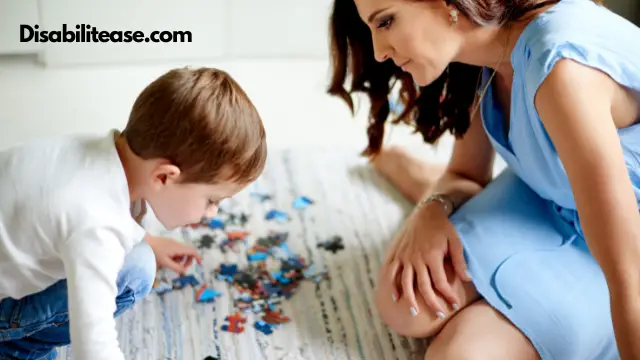Can dyslexia develop with age? Let’s discuss. Dyslexia has long been a topic of discussion, and now it’s much clear what dyslexia is or is not.

Dyslexia is a brain condition that impacts a person’s reading, spelling, and writing skills. It has nothing to do with a person’s intelligence; they can be as bright as any other person without dyslexia.
For people with dyslexia, when undergoing brain imaging, the brain is shown to be structured differently than the rest. Usually, this runs in the family, and one might have a parent or sibling with the same condition.
Here is a related article that might interest you on Can Dyslexia Affect IQ Scores?
Dyslexia is usually identified in children even before they start going to school, but sometimes it remains undiagnosed and comes out later in life.
Table of Contents
Does Dyslexia Develop With Age? Can Aging Make You Dyslexic?
Dyslexia is a condition that runs from one generation to the other and is diagnosed during childhood, but there are many cases and famous personalities that got it diagnosed later in life.
The famous “Friend series” actress Jennifer Aniston learned about dyslexia in her 20s, and an undefeatable boxing star and an excellent wordsmith “Muhammad Ali” was also dyslexic.
Dyslexia is not a disease but rather a condition that runs in certain families. People who have dyslexia usually have blood related relatives who also suffer from this. At the same time, the severity of this disease depends on genetic and environmental factors and stressors.
The probability of developing dyslexia with age is significantly fewer. It’s usually seen in childhood, and if it’s disguised young, it appears due to specific reasons and under the circumstances in adults.
Despite being a condition that has been there with a person since birth, there are few conditions in which people are found with dyslexia in their later stages of lives.
Some Of These Causes Are:
- Dyslexia solely due to increasing age:
Age causes a decline in higher mental functions related to speech, memory, and concentration. These patients, just like the young dyslexic patient, find difficulty in reading, writing, and phonetic processing. Still, unlike the young dyslexic patient, the older one also experiences disturbance in motor functions.
- As an adaptation to the stress:

New research that focuses on the effect of stress on the neurobiological system of humans has discovered a relationship between being exposed to stress, especially at the early stage, and being dyslexic.
The stress is at once tolerance level, and the individual will copy it; otherwise, it will cause an adverse effect.
When a lady is pregnant, the maternal stress can result in a severe form of dyslexia in the fetus; likewise, a person might have a mild form of dyslexia and develop learning strategies that hid the condition can be exacerbated later in life or just with increasing age due to cortico-limbic response to stress.
- As a result of trauma
Traumatic dyslexia is the most typical type of dyslexia in adults. Brain injury due to trauma can affect certain part of the brain or haemorrhage at the site that deals with speech, reading, and phonetic association (Cerebral cortex and thalamus). This can cause dyslexia-like symptoms in adults.
- Dementia and dyslexia
Both involve cognitive functions of the brain. Dyslexia affects dementia and vice versa.
- Physical abuse
Physical abuse is linked with dyslexia. They are at more risk of being bullied in childhood, school, or even later. Even when dyslexic, their dyslexic can become worst.
Progression Of Symptoms Over Ages:
Before going to school:
- Starts speaking words late.
- Learning words slowly
- Unable to form phrases and sentences
- Difficulty in remembering and recognizing colors and letters
- Difficulty in pronouncing words that rhyme
At school age
- Unable to read like other children studying along
- Poor problem-solving understanding
- Poor memory and pronunciation of words
- No confidence while reading activities and never read aloud.
Teenage and adult years
- Avoid activities that involve reading.
- They work slowly and talk in a low voice
- Trouble in pronunciation and spelling.
- Difficulty in maths
- Poor memory skills
Difficulty in reading is the mainstay of this disease but as compared to children adults are better readers as they have coping strategies around different difficulties that they have adapted over time. Although some problems such as memorisation skills may exist in all age groups.
Dyslexia varies from child to child, and also it varies from age to age, child, and adult. Following are the types of dyslexia found in adults:
- Dysnemkinesia: Impairment of motor skills and difficulty writing the letters. They usually write letters backward like they will write ‘b’ as ‘d’.
- Dyseidesia: Such a person has complex in reading the words and the letters. They cannot pronounce them correctly and lack the understanding ability of an unknown word.
- Dysphonesia: Difficulty in pronouncing words and understanding unknown words.
Takeaway
It’s usually by birth and can become worse or better as individual’s age progresses depending upon the environment.
When people know about this condition, they take it as a disability, and their confidence shatters; however they need to be counselled that it’s a condition and not a disease. It’s normal how our body changes as we age and respond differently to similar stimuli and stressors.
Slowing of cognitive movements, decreased problem-solving ability decreased memorizing skills. When people who have dyslexia undergo aging, their abilities decline more than others as they already had them, making them one step ahead. This can be quite stressful especially for the extremes of age group.
Another post that will interest you is about Can Dyslexia Impact Speech?
Having a person who can understand them , encourage them throughout this journey can make things easier for them . this can be your parents , siblings , friends or any other relation that adores you. A supportive atmosphere, compensatory strategies , practice can transform a dyslexic person into an almost any other non-dyslexic human being.

Hi, my name is Eddie, I am a professional trainer specializing in the elderly population and I’m also a website designer. I love training in the gym, going to the beach, traveling, and having good food.
I combined my love for sport and website designing to make “DisabilitEase” whose purpose is to help elderly and disabled people live a more full and active life, have more fun, and enjoy their unique journey despite any disability.



